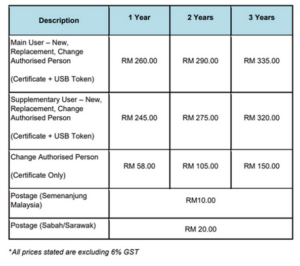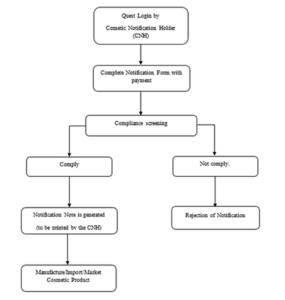Azmi & Associates | View firm profile
Introduction
Cosmetic products in Malaysia are generally regulated under Sale of Drugs Act 1952 to be read together with Control of Drugs and Cosmetic Regulations 1984 (“CDCR”)1 and Guidelines for Control of Cosmetic Products in Malaysia (“Guidelines”). Under CDCR, a company which intends to manufacture, sell, supply, import and possess any cosmetic product must ensure that the cosmetic product is a notified cosmetic by obtaining the appropriate approval from National Pharmaceutical Regulatory Agency (“NPRA”)2 under the purview of the Ministry of Health. Failing which, it shall be considered as an offence which liable to a fine not exceeding Ringgit Malaysia Twenty-Five Thousand Only (RM25,000.00) or to imprisonment for a term not exceeding three (3) years or to both.3
Regulatory Requirements for Cosmetic Notification
Prior to the notification of any cosmetic products, NPRA will require the company to fulfill the following requirements:
Safety Requirement
The assessment of the level of safety for a finished product, which in this case any cosmetic product shall be done from at least three (3) aspects namely, ingredients contained, chemical structure, and level of exposure. This is the baseline set out by the NPRA which is also in line with the Article 8(d) of the ASEAN Cosmetics Directive.4
The approach in ensuring the safety of a cosmetic product shall took few issues into account as follows:
- Careful selection of cosmetic ingredients, making sure that the same will be safe at a given concentration in a given finished product;
- Cosmetic products shall not contain ingredients that are prohibited by the local government (Poison Act 1952 and the Guidelines);
- Checking local tolerance of the finished product;
- Selection of adequate packaging to maintain the quality of the cosmetic products and to avoid, as far as possible, risks of misuse or accident;
- Quality control, mainly microbiological and chemical and also stability studies of the cosmetic product’s shelf life and its packaging;
- Adequate procedures in case of side effects with the marketed cosmetic product; and
- Ensuring corrective action or follow-up, if any visible product change or adulteration is advised from the marketplace.5
Labelling Requirements
According to NPRA, an appropriate labelling of the cosmetic products shall appear on its outer packaging or, if there is none, then it will have to be on the immediate packaging of the cosmetic products. The following particulars shall appear as below:
- the name of the product and its function;
- instructions on the use of the product;
- full ingredient listing and must be declared in descending order of weight at the time they are added;
- country of manufacture;
- the name, address and contact number of the company that holds the relevant license or certificate;
- the manufacturing batch number and its manufacturing or the expiry date of the product; and
- special precautions to be observed in use.6
Application Procedures for Cosmetic Notification
Since 1st January 2008, cosmetic products in Malaysia are controlled through notification procedure. As such, each company is required to notify NPRA before it can sell, manufacture, and distribute any cosmetic products. The requirements and procedure to register the cosmetic products shall be as follows:
Requirements for the Cosmetic Notification Holder
The companies which are responsible for placing the cosmetic products in the market is known as Cosmetic Notification Holder (“CNH”). CNH is responsible to ensure that the information of the cosmetic products including documents on product quality, safety and claimed benefit is available and accessible upon request by NPRA. CNH must be a locally incorporated company or legal entity in the field of cosmetics.7 Further, CNH may or may not be the product owners. It means that if foreign companies intend to export its cosmetic products to Malaysia, such foreign companies are not required to be registered in Malaysia and can appoint third party company in Malaysia to be the CNH.
Registration with Quest System
As the CNH fulfills the above requirements, CNH must first register for a Quest membership through online system as provided by NPRA via NPRA’s website. CNH is required to fill up its relevant information and provide the relevant documents in the Quest system such as certificate of incorporation and the constitution of the CNH. The charges for Quest membership would range between Ringgit Malaysia Two Hundred and Sixty Only (RM260.00) and Ringgit Malaysia Three Hundred and Thirty-Five Only (RM335.00) depending on the validity period of the membership. Further details on the fees are as tabulated below:8

Further, in the event the CNH fails to comply with the Guidelines in registering with the Quest system, it will cause the application of the same to be rejected by NPRA.
Notification of the Cosmetic Products
Upon successful registration for CNH in the Quest system, all submission for notifications of the cosmetic products shall be done online through Quest system. CNH must complete the notification form on the Quest system and proceed with the payment of Ringgit Malaysia Fifty Only (RM50.00) (for each product, and variant (if any))9 as the processing fee to the NPRA. Then, the cosmetic products will undergo a compliance screening to determine whether it complies with the regulatory requirements. If it complies, the notification note will be generated, and the cosmetic products can be registered and enter the market.10 The whole process of the notification may take one (1) week to one (1) month depending on further documents and information as may be required by NPRA. Furthermore, the notification of cosmetic products shall be valid for two (2) years and the renewal of the same should be done no later than one (1) month prior to notification expiry. The renewal fees for the notification of the cosmetic products have the same rate of Ringgit Malaysia Fifty Only (RM50.00) (for each product, and variant (if any)).
A brief workflow of a notification process are as follows:

Notification Exemption
A locally registered company which intends to manufacture or import its cosmetic products may be exempted from obtaining notification from NPRA for the following purposes11, subject to written approval by the Director of Pharmaceutical Services:
Market Sampling
Subject to the cosmetic products shall not be for commercial sale, a one-time entry of cosmetic products solely for the purpose of test market or aesthetic studies to ascertain whether the products are well perceived by a potential group of consumers or manufacturers are not required to be notified with NPRA.
In-house Evaluation
Subject to the cosmetic products shall not be for commercial sale, the product samples (either from Research and Development or production line that are evaluated by the company for the purpose of product selection, in-house sampling or demonstration) are not required to be notified with NPRA. These products may also be actual products that are readily available in the country of origin.
Products for Export Only (FEO) or for Re-Exporting
Cosmetic products that are imported to be assembled, enclosed, packed or labelled solely for re-export or manufactured locally solely for export-only are not required to be notified with NPRA.
In Transit
Cosmetic products taken or sent from any country and brought into Malaysia by land, air or water, whether or not landed or transhipped in Malaysia, for the sole purpose of being carried to another country either by the same or another conveyance are not required to be notified with NPRA.
Products to be Sold or Supplied in Free Trade Zone or International Carriage Entering or Leaving Malaysia
Cosmetic products that are imported for sale/supply in the free trade zone or international carriage by ships, aircraft or other forms of international public transport entering or leaving Malaysia are exempted to be notified with NPRA.
Other Licenses & Certificates that may be Required by Cosmetic Products Company
In addition to the notification of the cosmetic products with NPRA above, there are also different types of licenses and certificates that a company is required or recommended to apply from NPRA and other relevant authorities in order to sell, manufacture, import or wholesale cosmetic products in Malaysia such as manufacturer license, wholesaler license, clinical trial import license, import license, certificate of free sale, Good Manufacturing Practice certificate (“GMP”), Good Distribution Practice certificate (“GDP”), any GMP or GDP certificate from other international standard organization (i.e. Lloyd’s Register) and Halal certificate.
It is also pertinent to note that not all the above-mentioned licenses and certificates are mandatory to be applied by the cosmetic products company. However, there are certificates such as GMP or GDP that are prerequisite prior to the application of the cosmetic notifications, wholesaler license and manufacturer license to NPRA.
1. NPRA’s website https://www.npra.gov.my/index.php/en/cosmetic-main-page.html
2. Regulation 18A of Control of Drugs and Cosmetics Regulations 1984
3. Section 12 of Sale of Drugs Act 1952
4. Glossary and the Introduction of the Guidelines for Control of Cosmetic Products in Malaysia https://cutt.ly/sbWAOGq
5. Ibid
6. Ibid
7. Ibid
8. Annex 1, part 3: Charges for Quest Membership
9. Please take note that every product will be charged RM50.00 by NPRA even though it falls under the same category (as usually the same category has a different variant).
10. Paragraph 2 of the Guidelines for Control of Cosmetic Products in Malaysia https://cutt.ly/sbWAOGq
11. Paragraph 7 of the Guidelines for Control of Cosmetic Products in Malaysia https://cutt.ly/sbWAOGq